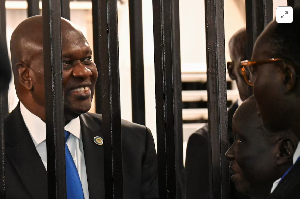President Nana Addo Dankwa Akufo-Addo has appointed a former Deputy Director of the World Health Organisation (WHO), Dr Anarfi Asamoa-Baah, as the Presidential Coordinator for Government’s Coronavirus Response Programme.
Dr Asamoa-Baah is expected to be President Akufo-Addo’s point man for Ghana’s response effort.
He will “be responsible for pulling together and co-ordinating all aspects of the response programme by Government,” a statement said.
Dr. Asamoa-Baah holds a Masters Degree in Community Health from the Liverpool School of Tropical Medicine, UK, and a Bachelors Degree in Medicine and Surgery (MB.Ch.B) from the University of Ghana Medical School.
He also holds Postgraduate Diplomas in Health Planning from Keele University, UK, Health Economics from the University of Aberdeen, Scotland and Health Policy from the University of Wisconsin, USA.
He comes to the job with a suitable wealth of experience such as supervising the creation of a new Health Emergency Programme in WHO following the Ebola outbreak in 2014, leading WHO’s work in developing the Ebola vaccine, leading the team that developed a formal process of quality control for the training and verification of Emergency Medical Teams, and providing leadership for the development of the Pandemic Influenza Preparedness Framework in 2011.
He also led the development of WHO R+D Blueprint to cut the time needed to develop and manufacture candidate products from years to months, chaired the WHO Senior Management Committee that developed strategies and plans for the control of epidemics (Ebola, Merco, Zika and Famine), and led the global efforts to develop a streamlined and integrated strategy for Neglected Tropical Diseases and in the process helped to coin the name “Neglected Tropical Disease”.
Dr Asamao-Baah supervised the technical development of a rapid and reliable diagnostic test suitable for use in resource restrained settings for sleeping sickness and Chagas disease, the mapping of NTDs in sub-Saharan Africa, pinpointing areas of endemicity and allowing a much more targeted approach to mass drug administration and the surveillance needed to oversee its impact, developed technical strategies for the management of diseases with epidemic potential, worked to establish vaccine stockpiles for meningitis, smallpox, cholera and yellow fever; and worked to establish of protocols for the management of hemorrhagic fevers.
General News of Thursday, 19 March 2020
Source: 3news.com













